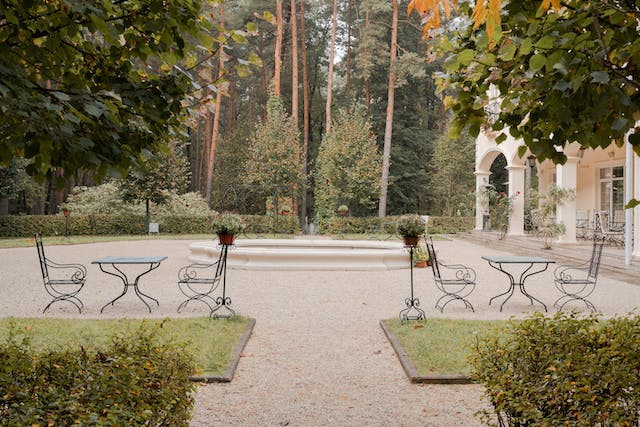Feng Shui, an ancient Chinese art, is not limited to interior design. It can also be seamlessly incorporated into your garden landscape. By harnessing the principles of Feng Shui, you can create a harmonious outdoor space that attracts positive energy and promotes balance.
Explore ten valuable tips on integrating positive feng shui philosophy into your garden to ensure that your outdoor spaces become sanctuaries that produce positive energy.
Understand the basics of Feng Shui
Before delving into the specifics, it’s essential to grasp the fundamentals of Feng Shui. Good Feng Shui is all about creating balance and harmony by aligning your environment with the principles of nature and the five elements: wood, fire, earth, metal, and water.
Wood represents growth and vitality, so incorporate green plants, tall trees, and vibrant grass from quality seed providers like Nature’s Seed into your garden.
Fire symbolizes passion and energy, and making a fire pit is a great addition. The earth element stands for stability. You can use stones or earthy tones in your design. Metal signifies precision and clarity, so use metal art pieces strategically.
Lastly, water represents fluidity and abundance, so include water features like ponds or fountains.
Map out your garden’s Bagua
In Feng Shui, the Bagua map is a crucial tool for analyzing the energy flow in your garden design. By superimposing the Bagua map over your outdoor and indoor space, you can identify which areas correspond to different aspects of your life, such as wealth, health, and relationships.
If the wealth area in your garden needs to be improved, consider adding elements like lush greenery, large trees, or decorative items associated with abundance.
For health, create a serene space to meditate or do yoga.
Embrace natural features
To achieve good Feng Shui, working with your garden’s natural features is essential. If you have tall trees, meandering paths, or a small pond in your front yard, consider how these elements can be integrated into your design to enhance good energy flow.
For instance, if you have a swimming pool or a small pond, you can introduce fish into it. Fish symbolize abundance and prosperity in Feng Shui and are believed to bring good fortune.
Balance the five elements
Each of the five elements in Feng Shui represents different qualities and attributes. Ensure that all five elements are present and balanced for a harmonious garden.
For instance, the earth can be represented through stone pathways or earthy-toned outdoor and patio furniture. Consider hiring a feng shui practitioner to help you with your garden design.
Create curvy pathways
Unlike indoor spaces that often feature straight lines, a Feng Shui garden benefits from gently curving pathways. Curvy lines symbolize the flow of energy and prevent it from becoming stagnant.
Meandering paths can lead visitors through your garden, promoting a sense of discovery and tranquility.
Use wind chimes
A wind chime is pleasing to the ears and serves a vital role in a Feng Shui garden. They help disperse negative energy and invite good energy into your garden. Hang wind chimes near your outdoor seating area or the entrance to your garden to create a soothing soundscape.
Consider bamboo chimes for their gentle and calming sound. At the same time, metal chimes can provide clarity and precision to your garden’s energy.
Incorporate Jade plants
Jade plants are considered auspicious in Feng Shui, as they symbolize prosperity and good fortune. Place potted jade plants strategically to attract positive energy and abundance.
Jade plants are easy to care for and can thrive indoors and outdoors. Consider placing them near entrances or garden areas to enhance wealth and prosperity.
Establish natural barriers
To shield your garden from negative influences, consider using other natural features or barriers like tall trees, shrubs, or a natural fence. These elements act as protective shields, ensuring that the energy within your garden remains undisturbed.
Pay attention to outdoor lighting
Outdoor lighting plays a crucial role in Feng Shui, as it enhances the overall ambiance of your garden design. Soft and warm lighting creates a cozy and inviting atmosphere, while harsh or bright lights should be avoided as they can disrupt the balance of energy.
Connect your indoor and outdoor spaces
Ensure that your indoor and outdoor spaces flow seamlessly together for the best results. This connection allows for a continuous energy flow throughout your home. Keep your front door visible from your garden, use similar color palettes, and maintain a consistent design theme.
Connecting your indoor and outdoor spaces creates a sense of unity and harmony.
Last words
Integrating Feng Shui principles into your garden design and landscape can significantly enhance your outdoor space’s energy and overall aesthetics. By understanding the basics, mapping out your Bagua, and following these tips, you can create a garden that harmoniously blends nature, energy, and design.

